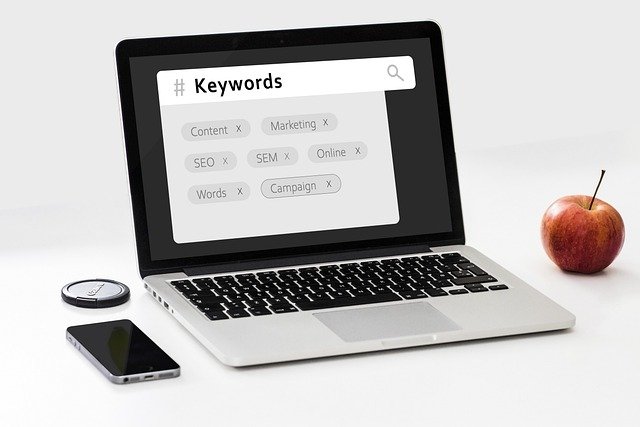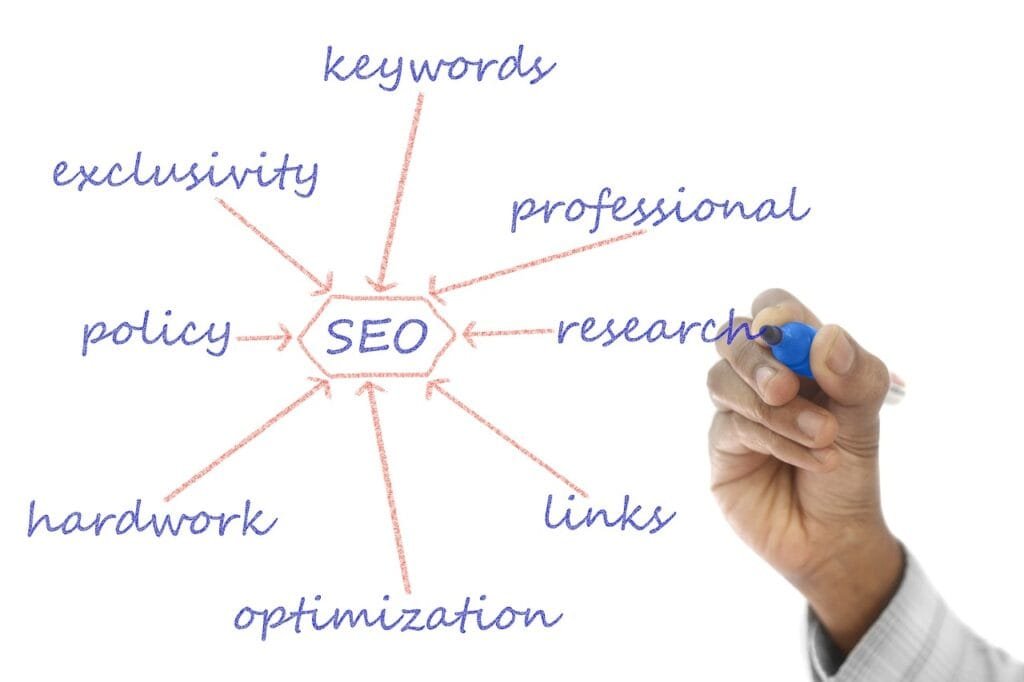This Article has been revised, edited and added to, by Poulomi Chakraborty.
- Content Optimization with AI
- Keyword Research with AI
- Voice Search Optimization with AI
- Improving User Experience with AI
- Predictive Analytics for SEO Strategy
- Enhancing Link Building with AI
- AI-Driven Technical SEO Improvements
- Leveraging AI for Local SEO
- AI and Content Creation for SEO
- AI in Enhancing User Experience for SEO
- AI and Predictive Analytics in Healthcare SEO
- AI for Competitive Analysis in SEO
- AI in Local SEO for Healthcare
- Future of AI in Healthcare SEO
- Leveraging AI for Enhanced Data Security in Healthcare SEO
- AI-Driven Social Media Integration for SEO
- AI in Content Marketing for Healthcare SEO
- AI in Voice and Visual Search for Healthcare SEO
- The Future of AI in Healthcare SEO
- Conclusion
Artificial intelligence (AI) is revolutionizing many industries, and healthcare is no exception. For healthcare websites, AI is transforming search engine optimization (SEO) by providing tools and techniques that enhance visibility, improve user experience, and drive more traffic. This shift is crucial as more patients turn to online resources to find healthcare information, book appointments, and connect with providers.
AI’s ability to analyze vast amounts of data and predict user behavior is at the heart of this transformation. By understanding and implementing AI-driven SEO strategies, healthcare websites can stay ahead of the competition, attract more visitors, and provide better service to patients.
In this article, we’ll explore how AI is changing SEO for healthcare websites. We’ll cover various aspects, including content optimization, keyword research, voice search, user experience, and predictive analytics. By the end, you’ll have a comprehensive understanding of how to leverage AI to improve your healthcare website’s SEO and overall performance.
Content Optimization with AI

Enhancing Content Quality
AI-powered tools can significantly enhance the quality of content on healthcare websites. These tools analyze existing content and provide insights on how to improve it. They suggest keywords, identify content gaps, and recommend changes to make the content more engaging and informative.
For healthcare providers, this means creating content that answers patients’ questions effectively and ranks higher on search engines.
AI also helps in generating content. Natural language processing (NLP) algorithms can create high-quality articles and blog posts that are not only informative but also optimized for SEO. This is particularly useful for healthcare websites that need to regularly update their content with the latest medical research and trends.
Personalized Content Recommendations
Personalization is a key factor in modern SEO. AI enables healthcare websites to provide personalized content recommendations to users. By analyzing user behavior, AI can predict what type of content a visitor is likely to find useful.
This helps in delivering a customized experience, increasing user engagement and time spent on the website, which are important metrics for SEO.
For example, if a visitor frequently reads articles about diabetes management, AI can recommend related content, such as diet tips, medication information, and success stories from other patients. Personalized recommendations make users feel valued and understood, encouraging them to return to the site.
Automating Content Updates
Keeping content up-to-date is crucial for maintaining good SEO rankings. AI can automate this process by regularly checking for outdated information and suggesting updates.
This is particularly important for healthcare websites, where accurate and current information is essential. AI tools can scan medical journals, news sites, and other reliable sources to identify new information that can be incorporated into existing content.
By ensuring that all content is current and relevant, healthcare websites can maintain their credibility and authority, which are key factors in search engine rankings. Automated updates also save time and resources, allowing healthcare providers to focus on other important aspects of patient care.
Keyword Research with AI
Finding the Right Keywords
Keyword research is the foundation of any SEO strategy. AI tools have revolutionized this process by providing deeper insights and more accurate predictions. Traditional keyword research methods often involve guesswork and can be time-consuming.
AI eliminates these challenges by analyzing vast amounts of data to identify the most effective keywords for your healthcare website.
AI-powered keyword research tools can identify long-tail keywords, which are more specific and often less competitive than short-tail keywords. For example, instead of targeting a broad keyword like “diabetes,” AI can help identify more specific keywords such as “managing type 2 diabetes in elderly patients.” These targeted keywords are more likely to attract users who are looking for specific information, improving your site’s relevance and ranking.
Predicting Keyword Trends
One of the significant advantages of AI in keyword research is its ability to predict trends. AI algorithms can analyze search patterns and forecast which keywords will become popular in the future. This allows healthcare websites to stay ahead of the curve and create content that targets emerging trends.
For instance, during the COVID-19 pandemic, there was a sudden surge in searches related to the virus. AI tools quickly identified this trend, enabling healthcare websites to create relevant content that addressed the public’s concerns.
By staying updated with keyword trends, healthcare websites can attract more traffic and improve their SEO performance.
Analyzing Competitor Keywords
Understanding what keywords your competitors are targeting can provide valuable insights into your SEO strategy. AI tools can analyze your competitors’ websites and identify the keywords they are ranking for.
This information helps you understand the competitive landscape and find opportunities to target keywords that your competitors might be missing.
By analyzing competitor keywords, healthcare websites can also identify gaps in their content and create new content that fills these gaps. This not only improves your SEO but also positions your website as a comprehensive resource for healthcare information.
Voice Search Optimization with AI

Understanding Voice Search
Voice search is becoming increasingly popular, thanks to the widespread use of smart speakers and voice assistants like Siri, Alexa, and Google Assistant.
For healthcare websites, optimizing for voice search is crucial as more users rely on voice queries to find health-related information. AI plays a significant role in understanding and optimizing for voice search.
Voice searches are often more conversational and longer than text searches. For instance, a text search might be “best cardiologist near me,” while a voice search could be “Who is the best cardiologist near me?”
AI helps healthcare websites adapt to these differences by analyzing natural language patterns and optimizing content to match the way people speak.
Optimizing Content for Voice Search
To optimize for voice search, healthcare websites need to focus on conversational keywords and long-tail phrases. AI tools can help identify these keywords by analyzing voice search data and predicting common queries.
For example, AI might suggest optimizing for questions like “How to manage high blood pressure naturally?” or “What are the symptoms of diabetes?”
Creating content that answers these specific questions can significantly improve your chances of ranking for voice search queries. Additionally, structuring content using question-and-answer formats and incorporating schema markup can make it easier for search engines to understand and retrieve your content for voice searches.
Enhancing Local SEO with Voice Search
Voice searches often have a local intent, with users looking for nearby healthcare providers or services. AI can help optimize your healthcare website for local SEO by analyzing local search trends and identifying relevant keywords.
Ensuring that your website is optimized for local voice searches involves including location-specific information, such as the name of your city or neighborhood, in your content.
Moreover, AI can help manage and optimize your Google My Business profile, which is crucial for local SEO. Keeping your business information accurate and up-to-date ensures that users find the right information when performing voice searches like “Find a pediatrician near me.”
Improving User Experience with AI
Personalizing User Interactions
Personalization is a key factor in enhancing user experience, and AI excels in delivering personalized experiences. For healthcare websites, AI can analyze user behavior and preferences to provide tailored content recommendations, appointment reminders, and personalized health tips.
This level of personalization makes users feel valued and engaged, encouraging them to spend more time on your website.
For example, if a user frequently reads articles about mental health, AI can suggest related content, such as therapy options, mental health exercises, or success stories. Personalized interactions not only improve user satisfaction but also contribute to better SEO by increasing engagement metrics like time on site and pages per session.
Enhancing Website Navigation
A well-structured and easy-to-navigate website is essential for a positive user experience. AI can analyze user behavior to identify navigation issues and suggest improvements. For instance, if AI detects that users are frequently abandoning a particular page, it might indicate a problem with the page’s content or layout.
AI-powered chatbots can also enhance website navigation by providing instant assistance to users. These chatbots can answer common questions, guide users to relevant information, and even help with appointment scheduling.
By improving navigation and providing quick access to information, AI enhances user experience and boosts SEO performance.
Improving Page Load Speed
Page load speed is a critical factor in both user experience and SEO. Slow-loading pages can frustrate users and lead to higher bounce rates, negatively impacting your search engine rankings.
AI tools can analyze your website’s performance and identify factors contributing to slow load times. These tools provide actionable insights on optimizing images, reducing server response times, and leveraging browser caching.
By implementing AI-driven recommendations to improve page load speed, healthcare websites can provide a smoother and more enjoyable user experience. Faster load times not only keep users engaged but also positively impact your SEO rankings.
Predictive Analytics for SEO Strategy

Anticipating User Needs
Predictive analytics involves using AI to analyze historical data and predict future trends. For healthcare websites, predictive analytics can be a game-changer in anticipating user needs and optimizing content accordingly.
By understanding what topics or queries are likely to become popular, healthcare providers can create content that meets these emerging demands.
For instance, AI might analyze search trends and predict a rise in interest in telehealth services. By creating and optimizing content around telehealth, healthcare websites can attract more visitors and stay ahead of the competition. Predictive analytics helps you stay proactive rather than reactive in your SEO strategy.
Enhancing Content Strategy
Developing a content strategy that aligns with user needs and search trends is essential for effective SEO. AI-powered predictive analytics can provide valuable insights into what types of content are likely to perform well.
By analyzing data on user behavior, search patterns, and engagement metrics, AI can suggest topics, formats, and keywords that will resonate with your audience.
For example, if predictive analytics indicates a growing interest in holistic medicine, healthcare websites can create content that explores various holistic treatment options. This proactive approach ensures that your content remains relevant and engaging, driving more traffic and improving SEO performance.
Monitoring and Adjusting Strategies
SEO is an ongoing process that requires constant monitoring and adjustment. AI-driven predictive analytics can help healthcare websites track the effectiveness of their SEO strategies and make data-driven adjustments.
By continuously analyzing performance metrics, AI can identify areas for improvement and suggest changes to optimize results.
For instance, if AI detects a decline in organic traffic to certain pages, it can analyze the content and suggest updates or improvements. This might involve adding new information, optimizing for different keywords, or improving the user experience.
Regularly refining your SEO strategy based on predictive analytics ensures that your healthcare website remains competitive and continues to attract and retain visitors.
Enhancing Link Building with AI
Identifying High-Quality Backlink Opportunities
Link building is a critical component of SEO, and AI can significantly enhance this process for healthcare websites. AI-powered tools can identify high-quality backlink opportunities by analyzing your competitors’ backlink profiles and identifying authoritative sites within your niche.
By targeting these opportunities, you can build a strong backlink profile that boosts your website’s authority and search engine rankings.
AI can also help you identify broken links on other websites that you can replace with your own content. This technique, known as broken link building, involves reaching out to website owners to suggest your content as a replacement for the broken links. By offering valuable and relevant content, you can earn high-quality backlinks that improve your SEO.
Automating Outreach Efforts
Outreach is an essential part of link building, but it can be time-consuming. AI can streamline this process by automating outreach efforts. AI-powered tools can generate personalized email templates, track responses, and follow up with potential link partners. This automation saves time and ensures that your outreach efforts are consistent and effective.
By using AI to manage your outreach, you can focus on building relationships with key influencers and website owners in the healthcare industry. Strong relationships lead to more backlink opportunities and improved SEO performance.
Analyzing Backlink Profiles
Understanding your backlink profile is crucial for developing an effective link-building strategy. AI tools can analyze your existing backlinks and provide insights into their quality and relevance. By identifying high-quality backlinks and removing low-quality or toxic links, you can improve your website’s authority and search engine rankings.
AI can also help you monitor your competitors’ backlink profiles. By analyzing the types of sites linking to your competitors, you can identify new opportunities for your own link-building efforts. This competitive analysis ensures that you stay ahead of the competition and continue to build a strong backlink profile.
AI-Driven Technical SEO Improvements
Improving Site Structure
A well-structured website is essential for both user experience and SEO. AI can analyze your website’s structure and provide recommendations for improvements. This includes optimizing your site’s hierarchy, ensuring proper use of headings, and improving internal linking.
For healthcare websites, a clear and organized structure is crucial for helping users find the information they need. AI tools can identify areas where your site’s structure can be improved to enhance navigation and user experience.
These improvements not only make your site more user-friendly but also help search engines understand and index your content more effectively.
Enhancing Mobile Optimization
With more users accessing healthcare information on mobile devices, ensuring your website is mobile-friendly is critical. AI can analyze your site’s mobile performance and provide actionable insights on how to improve it. This includes optimizing images, improving load times, and ensuring that all content is accessible on mobile devices.
Mobile optimization is a key factor in SEO rankings, as search engines prioritize mobile-friendly sites. By using AI to enhance your website’s mobile performance, you can improve user experience and boost your search engine rankings.
Fixing Technical Issues
Technical issues can significantly impact your SEO performance. AI-powered tools can scan your website for common technical issues, such as broken links, duplicate content, and missing meta tags. These tools provide detailed reports and recommendations on how to fix these issues.
By regularly monitoring and addressing technical issues, you can ensure that your website remains optimized for search engines. This proactive approach helps maintain your site’s performance and improves your SEO rankings.
Leveraging AI for Local SEO

Optimizing for Local Search Queries
Local SEO is particularly important for healthcare providers, as many patients search for services within their vicinity. AI can help optimize your website for local search queries by analyzing local search trends and identifying relevant keywords. This involves incorporating location-specific keywords into your content and meta tags.
For example, AI might suggest optimizing for phrases like “best pediatrician in [city]” or “urgent care near [neighborhood].” By targeting these local keywords, you can attract more local traffic to your website and improve your local search rankings.
Managing Online Reviews
Online reviews play a significant role in local SEO. Positive reviews not only build trust with potential patients but also improve your search engine rankings. AI can help manage your online reviews by monitoring review sites, analyzing sentiment, and responding to reviews.
AI-powered tools can alert you to new reviews and provide suggested responses based on the sentiment analysis. By promptly addressing positive and negative reviews, you can maintain a positive online reputation and improve your local SEO.
Optimizing Google My Business
Google My Business (GMB) is a critical component of local SEO. AI can help optimize your GMB profile by ensuring that all information is accurate and up-to-date. This includes your business name, address, phone number, and hours of operation.
AI tools can also suggest updates and enhancements to your GMB profile, such as adding photos, responding to questions, and posting updates. An optimized GMB profile improves your visibility in local search results and attracts more local patients to your healthcare practice.
AI and Content Creation for SEO
Generating High-Quality Content
AI has advanced to the point where it can assist in generating high-quality content for healthcare websites. AI-powered content creation tools can produce articles, blog posts, and other forms of content that are informative, engaging, and optimized for SEO.
These tools use natural language processing (NLP) to create content that mimics human writing and includes relevant keywords.
For healthcare providers, this means being able to produce a steady stream of high-quality content that answers patients’ questions and provides valuable information. Regularly updating your website with fresh content improves your SEO and keeps visitors coming back for more.
Enhancing Content Relevance
Content relevance is a key factor in SEO. AI can analyze user behavior and search patterns to identify what type of content is most relevant to your audience. By understanding what your visitors are looking for, you can create content that meets their needs and interests.
For example, if AI analysis shows that many visitors are interested in mental health topics, you can focus on creating content related to mental wellness, therapy options, and coping strategies. This targeted approach ensures that your content is relevant and engaging, improving your SEO and user satisfaction.
Optimizing Content for Search Engines
AI tools can optimize your content for search engines by analyzing it for keyword density, readability, and overall quality. These tools provide suggestions for improving your content, such as adding keywords, enhancing readability, and making the content more engaging.
By following AI-driven recommendations, you can ensure that your content is optimized for search engines while still being valuable to your audience. Optimized content ranks higher in search results, driving more traffic to your website and improving your SEO.

AI in Enhancing User Experience for SEO
Personalizing User Experience
AI enables healthcare websites to offer a personalized experience for each visitor. By analyzing user behavior, AI can tailor the content, recommendations, and navigation paths to individual preferences.
For instance, if a visitor frequently reads about cardiovascular health, AI can prioritize displaying content, articles, and services related to heart health on their subsequent visits. This personalization increases user engagement and satisfaction, which are critical metrics for SEO.
Implementing AI-Powered Chatbots
AI-powered chatbots can significantly improve user experience on healthcare websites. These chatbots provide instant responses to user inquiries, help with booking appointments, and guide users to relevant information.
For example, a visitor looking for information on flu symptoms can interact with a chatbot to get immediate answers and recommendations. The efficiency and accessibility provided by chatbots keep users on the site longer, reducing bounce rates and improving SEO metrics.
Analyzing User Feedback
AI can analyze user feedback from various sources, such as surveys, reviews, and social media comments, to identify common issues and areas for improvement.
This feedback analysis helps healthcare websites understand user pain points and preferences, enabling them to make informed decisions about site updates and content creation.
By continuously improving the user experience based on feedback, healthcare websites can enhance user satisfaction and engagement, which positively impacts SEO.
AI and Predictive Analytics in Healthcare SEO
Forecasting User Trends
Predictive analytics uses AI to forecast future trends based on historical data. For healthcare websites, this means predicting what topics, services, or health concerns will become popular.
By understanding these trends, you can proactively create content and optimize your site to meet future demands. For example, if AI predicts a rise in interest in telehealth services, you can start producing content related to virtual consultations, remote patient monitoring, and telehealth benefits.
Staying ahead of trends ensures that your website remains relevant and authoritative, boosting your SEO.
Optimizing Content for Future Relevance
AI-driven predictive analytics can help healthcare websites optimize their content for future relevance. This involves identifying keywords and topics that are likely to gain traction and ensuring that your content is aligned with these trends.
For instance, if predictive analytics indicates a growing interest in holistic medicine, your website can start producing content on alternative therapies, integrative medicine practices, and patient success stories. By preparing for future trends, you can maintain a steady flow of traffic and enhance your SEO.
Adapting SEO Strategies
Predictive analytics also allows healthcare websites to adapt their SEO strategies dynamically. By continuously monitoring performance metrics and predicting future trends, AI can suggest adjustments to your SEO tactics.
For example, if AI detects a decline in organic traffic for specific keywords, it might recommend targeting new keywords or updating existing content. This adaptability ensures that your SEO strategy remains effective in an ever-changing digital landscape.
AI for Competitive Analysis in SEO

Monitoring Competitor Activities
AI-powered tools can provide real-time insights into your competitors’ activities. These tools can track your competitors’ content updates, backlink profiles, keyword rankings, and social media engagements.
By understanding what strategies are working for your competitors, you can refine your own SEO approach. For instance, if a competitor’s blog post on a particular health topic is performing well, you can create similar or better content to attract traffic to your site.
Identifying Gaps and Opportunities
Competitive analysis using AI helps identify gaps in your content and opportunities for improvement. AI can analyze competitors’ websites to find content areas they are not adequately covering.
These gaps represent opportunities for your healthcare website to provide valuable content and attract visitors. By filling these gaps with high-quality, relevant content, you can position your site as a comprehensive resource and improve your SEO rankings.
Benchmarking SEO Performance
AI tools allow healthcare websites to benchmark their SEO performance against competitors. These tools provide detailed reports on various SEO metrics, such as keyword rankings, domain authority, and backlink quality.
By comparing your performance with competitors, you can identify areas where you excel and areas needing improvement. This benchmarking helps you set realistic SEO goals and develop strategies to achieve them, ensuring continuous improvement and competitiveness.
AI in Local SEO for Healthcare
Enhancing Local Search Presence
Local SEO is crucial for healthcare providers, as many patients search for services within their geographic area. AI can enhance your local search presence by optimizing your website for location-specific keywords and search queries.
For instance, AI can help you incorporate keywords like “top dentist in [city]” or “urgent care center near [neighborhood]” into your content. This localization improves your visibility in local search results and attracts more nearby patients.
Managing Local Listings
Accurate and consistent local listings are vital for local SEO. AI-powered tools can manage your local listings across various platforms, such as Google My Business, Yelp, and healthcare directories.
These tools ensure that your business information, such as address, phone number, and hours of operation, is accurate and up-to-date. Consistent local listings improve your credibility and visibility in local search results, driving more traffic to your website.
Analyzing Local Search Trends
AI can analyze local search trends to provide insights into what services or treatments are in demand in your area. By understanding these trends, healthcare websites can optimize their content and services to meet local needs.
For example, if AI identifies a growing interest in pediatric services in your city, you can create content and promote services related to children’s healthcare. Aligning your offerings with local demand enhances your relevance and visibility in local search results, improving your local SEO.
Future of AI in Healthcare SEO
Continuous Learning and Adaptation
AI technology is continually evolving, and its applications in SEO are expanding. For healthcare websites, this means staying updated with the latest AI advancements and incorporating new tools and techniques into your SEO strategy.
Continuous learning and adaptation ensure that your website remains competitive and can effectively respond to changes in search engine algorithms and user behavior.
Integrating AI with Other Technologies
The future of AI in healthcare SEO involves integrating AI with other emerging technologies, such as augmented reality (AR) and virtual reality (VR). These integrations can provide immersive and interactive experiences for users, enhancing engagement and satisfaction.
For example, AI-driven AR applications can offer virtual tours of healthcare facilities, while VR can simulate patient consultations or medical procedures. These innovative experiences can attract more visitors to your website and improve your SEO metrics.
Embracing Ethical AI Practices
As AI becomes more integrated into SEO strategies, it’s essential to embrace ethical AI practices. This involves ensuring that AI tools and algorithms are transparent, fair, and respect user privacy. For healthcare websites, ethical AI practices are particularly important, given the sensitivity of health-related information.
By prioritizing ethical AI, healthcare providers can build trust with their audience and create a positive reputation, which contributes to long-term SEO success.
Leveraging AI for Enhanced Data Security in Healthcare SEO

Ensuring Data Privacy
In the healthcare sector, protecting patient data is paramount. AI can enhance data security by detecting and mitigating potential threats. AI algorithms can analyze vast amounts of data to identify unusual patterns or behaviors that may indicate a security breach.
For healthcare websites, implementing AI-driven security measures ensures that patient information remains confidential and protected.
AI also helps in compliance with data privacy regulations such as HIPAA (Health Insurance Portability and Accountability Act) in the United States and GDPR (General Data Protection Regulation) in Europe.
By ensuring that your website and data handling practices comply with these regulations, you can build trust with your audience and avoid legal issues that could harm your reputation and SEO.
Enhancing Cybersecurity Measures
Cybersecurity threats are a significant concern for healthcare websites. AI can bolster your cybersecurity measures by providing real-time monitoring and threat detection. AI-powered systems can quickly identify and respond to cyber threats, such as malware, phishing attacks, and ransomware, reducing the risk of data breaches and downtime.
For example, AI can detect unauthorized access attempts and automatically trigger security protocols to protect sensitive information. By maintaining robust cybersecurity measures, healthcare websites can ensure continuous operation, protecting their SEO efforts from being undermined by security incidents.
Building Trust with Users
Data security is directly linked to user trust. Patients and visitors need to feel confident that their personal information is safe when interacting with your healthcare website. By leveraging AI to enhance data security, you demonstrate a commitment to protecting user data, which builds trust and credibility.
Trust is a critical factor in SEO, as search engines prioritize websites that provide a secure and trustworthy user experience. Secure websites are more likely to rank higher in search results, attracting more organic traffic. By ensuring data security, you not only protect your users but also improve your SEO performance.
AI-Driven Social Media Integration for SEO

Enhancing Social Media Engagement
Social media is an essential component of a comprehensive SEO strategy. AI can enhance your social media efforts by analyzing user behavior and preferences to create engaging content. AI-powered tools can suggest the best times to post, the most effective types of content, and the ideal frequency of posts to maximize engagement.
For healthcare websites, engaging social media content can include health tips, patient testimonials, updates on medical research, and interactive Q&A sessions. By increasing social media engagement, you can drive more traffic to your website, improving your SEO metrics.
Analyzing Social Media Trends
AI can analyze social media trends to identify topics and conversations that are gaining traction. By understanding what your audience is talking about, you can create content that aligns with current trends and interests.
This trend analysis ensures that your social media content remains relevant and engaging, attracting more followers and interactions.
For example, if AI identifies a rising interest in mental health awareness, you can create and share content related to mental health resources, coping strategies, and patient stories. Engaging with trending topics boosts your social media presence and drives traffic to your healthcare website, enhancing your SEO.
Integrating Social Media and SEO Strategies
AI can help integrate your social media and SEO strategies for a cohesive digital marketing approach. By analyzing data from both social media and your website, AI can provide insights into how social media activities impact your SEO performance. For instance, AI can track how social media shares and interactions contribute to your website’s traffic and engagement metrics.
This integrated approach allows you to optimize your content and campaigns across both platforms, ensuring that your social media efforts support your SEO goals. By leveraging the synergies between social media and SEO, you can achieve better visibility and reach for your healthcare website.
AI in Content Marketing for Healthcare SEO
Creating Engaging Visual Content
Visual content, such as images, infographics, and videos, plays a crucial role in engaging users and enhancing SEO. AI-powered tools can help create and optimize visual content that resonates with your audience.
For healthcare websites, this might include educational infographics about medical conditions, tutorial videos on health practices, and visually appealing blog graphics.
AI can analyze the effectiveness of different types of visual content, providing insights into what works best for your audience. By creating engaging visual content, you can increase user interaction and time spent on your site, both of which positively impact SEO.
Optimizing Content Distribution
Content distribution is as important as content creation. AI can optimize the distribution of your healthcare content by identifying the best channels and times to share your content. This ensures that your content reaches the right audience at the right time, maximizing its impact.
AI-powered tools can schedule posts, share content across multiple platforms, and track the performance of each piece of content. By optimizing content distribution, you can increase visibility and drive more traffic to your website, enhancing your SEO efforts.
Measuring Content Performance
Understanding how your content performs is crucial for continuous improvement. AI can provide detailed analytics on content performance, including metrics such as views, shares, engagement, and conversions. These insights help you identify which types of content resonate most with your audience and which areas need improvement.
For example, AI might reveal that blog posts on preventive healthcare receive the most engagement, suggesting that you should focus more on this topic. By regularly measuring and analyzing content performance, you can refine your content strategy to better meet the needs of your audience and improve your SEO.
AI in Voice and Visual Search for Healthcare SEO
Optimizing for Voice Search
Voice search is becoming increasingly popular, especially for healthcare queries. AI can help optimize your website for voice search by identifying the natural language patterns and questions that users are likely to ask.
This involves optimizing your content with conversational keywords and structured data that make it easier for voice assistants to understand and retrieve your information.
For instance, optimizing for voice search might involve answering common questions in a clear and concise manner, such as “What are the symptoms of flu?” or “How do I find a nearby dentist?” By making your content voice-search-friendly, you can attract more traffic from users who prefer using voice commands.
Enhancing Visual Search Capabilities
Visual search is another emerging trend in SEO, allowing users to search for information using images instead of text. AI-powered visual search tools can analyze and understand images, making it possible for healthcare websites to optimize their visual content for search engines.
For example, AI can help tag and categorize medical images, making them more discoverable in visual search results. Patients might use visual search to identify symptoms or find information about a particular medication.
By optimizing your visual content, you can improve your website’s visibility and attract more users who rely on visual search.
Integrating AI with Search Technologies
Integrating AI with voice and visual search technologies can enhance the overall search experience for users. By leveraging AI to understand and predict user behavior, healthcare websites can create content that is easily accessible through both voice and visual search.
For instance, AI can analyze voice search queries to identify common health concerns and create content that addresses these queries. Similarly, AI can optimize visual content for search engines, ensuring that users find relevant information quickly and easily. This integrated approach improves user satisfaction and boosts your SEO performance.
The Future of AI in Healthcare SEO
Advancements in AI Technology
The future of AI in healthcare SEO holds exciting possibilities as technology continues to advance. AI algorithms are becoming more sophisticated, enabling more accurate predictions, deeper insights, and more effective optimization strategies. Healthcare websites that stay ahead of these advancements can leverage the latest AI tools to maintain a competitive edge in SEO.
Embracing New AI Applications
New AI applications are emerging that can further enhance healthcare SEO. For instance, AI-driven virtual assistants can provide personalized health advice and support, while AI-powered content generators can produce high-quality articles tailored to specific audience segments.
By embracing these new applications, healthcare websites can continue to innovate and improve their SEO strategies.
Building a Sustainable AI Strategy
To fully leverage the benefits of AI in healthcare SEO, it’s essential to build a sustainable AI strategy. This involves investing in the right AI tools, continuously training staff on AI best practices, and staying updated with the latest AI developments. By integrating AI into every aspect of your SEO strategy, you can create a robust and future-proof approach that drives long-term success.
Conclusion
Artificial intelligence is transforming SEO for healthcare websites by providing advanced tools and techniques that enhance visibility, improve user experience, and drive more traffic. AI’s ability to analyze data, predict trends, and personalize interactions is revolutionizing how healthcare providers approach SEO. From content optimization and keyword research to voice search and user experience enhancements, AI offers numerous benefits that help healthcare websites stay competitive and relevant.
By integrating AI into their SEO strategies, healthcare providers can ensure they meet the evolving needs of their audience, maintain a strong online presence, and achieve better search engine rankings. Embracing AI is not just about keeping up with trends but about proactively shaping the future of healthcare SEO.
READ NEXT:
- Impact Of GDPR On Marketers in EU and Outside
- Measuring the Impact of Social Media on Healthcare SEO
- Trust the Experts: SEO for Financial Advisers
- How to Conduct a Content Gap Analysis
- How to Use Pinterest for Healthcare SEO



















Comments are closed.